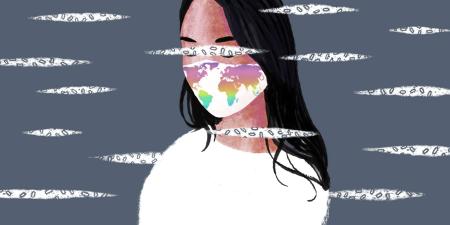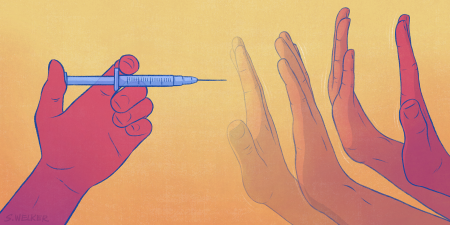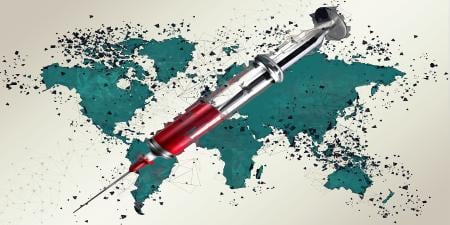Abstract
In response to the 2013-2016 Ebola virus disease (EVD) outbreak primarily affecting Guinea, Sierra Leone, and Liberia, the World Health Organization (WHO) set out Guidance for Managing Ethical Issues in Infectious Disease Outbreaks, which covered social distancing, research in outbreak settings, and clinical care. This article assesses the Guidance’s recommendations on research and long-term storage of biological specimens during infectious disease outbreaks and argues that the Guidance does not provide adequate direction for responders’, researchers’, and organizations’ actions. It considers local persons’ access to benefits of research in the aftermath of outbreaks and preparedness for outbreaks, drawing on lessons from both the 2013-2016 EVD outbreak and ongoing research in the Democratic Republic of the Congo.
Introduction
In 2016, the World Health Organization (WHO) published Guidance for Managing Ethical Issues in Infectious Disease Outbreaks.1 The Guidance arose in the context of the 2013-2016 Ebola virus disease (EVD) outbreak that primarily affected the Western African nations of Liberia, Sierra Leone, and Guinea; cases also arose in 7 other nations.2 That outbreak, declared a public health emergency of international concern (PHEIC) in August 2014,3 resulted in more than 28 000 suspected cases and 11 325 confirmed deaths.2
The WHO guidelines are particularly salient in light of the current EVD outbreak in the North Kivu and Ituri provinces of the Democratic Republic of the Congo (DRC), declared a PHEIC in July 2019.4 They span the gamut of bioethical issues: public engagement, allocation of scarce resources, public health surveillance, duty to treat, clinical research, use of experimental interventions, and vulnerability in the context of international and domestic sources of structural inequality.1 Many, if not most, of these concerns are not new and have been raised in the context of human immunodeficiency virus (HIV),5 armed conflicts,6,7 and previous EVD outbreaks.8 Nonetheless, the document is important for its scope and particular focus on infectious disease outbreaks within the purview of the International Health Regulations (IHR), from which PHEIC declarations arise.9
Infectious disease outbreaks are, in cases like EVD, one of the only times scientists can study a disease in situ. Clinical data on EVD is generally only collected in the context of outbreak responses.10 Moreover, testing novel vaccines and interventions on humans is sometimes only possible in the context of outbreaks, especially when it would be too risky to pursue human challenge experiments (ie, intentionally infecting subjects).11 Subjects of scientific12 and therapeutic research have some claim to benefits that arise from knowledge generated through their involvement in science and medicine, as may the communities in which those subjects reside. What that claim entails and how it should be executed, however, is subject to debate.
The management of EVD continues to raise serious questions about what the obligation to share scientific and clinical benefits entails, how to discharge that obligation, and who ought to discharge it. In March 2019, it was reported that blood samples taken during the West African EVD outbreak, which were reportedly held by American and British authorities, were being withheld from researchers in the countries they were taken from.13 Among other values, security was used to justify limiting access, as Ebola virus is considered a pathogen with high potential for development into a biological weapon. In June 2019, reporting from the DRC detailed ongoing negotiations to make vaccines tested in Western Africa affordable for widespread use, a process that was in limbo because of policies not to disclose the price of development and manufacture of the vaccine.14 The same report noted that of the thousands of samples collected by predominantly Western responders from patients in Liberia, Guinea, and Sierra Leone, neither the samples nor the proceeds from their sale and use in research had made their way back to their respective countries of origin. This circumstance was attributed, among other reasons, to the United States’ decision to not sign the Nagoya Protocol to the Convention on Biological Diversity,15,16 which would require mutually agreed-upon terms when exporting genetic samples from signatory countries (though, as some have argued, the ratification of the protocol by the host country alone may be sufficient to enforce this requirement15). As discussed below, the Guidance provides a broad framework for articulating what nations, including the United States, ought to do regarding benefit sharing during infectious disease outbreaks, but understanding why they ought to do it requires further interpretation, which we provide here.
Sharing Benefits of Research
Infectious disease outbreaks produce at least 3 broad classes of tangible objects or data that benefit individuals and communities. First, the treatment of patients produces clinical data that is useful in understanding the pathophysiology of disease, improving diagnosis and management, and improving public health surveillance. Second, collection of samples provides sequence data for humans and viruses, which are useful in the development of surveillance technologies, diagnostics, and medical interventions. Finally, the use of experimental interventions in outbreaks provides information and tangible products such as vaccines and therapeutics.1,17
Under principles of fair allocation of resources or equity, countries whose citizens have provided samples ought to have access to those samples.
The WHO claims all three of the above benefits should be shared.1 Section 10 of the Guidance states that clinical data must be shared rapidly to assist in responding to an outbreak. It notes that “every researcher who engages in generation of information related to a public health emergency or acute public health event with the potential to progress to an emergency has the fundamental moral obligation to share preliminary results once they are adequately quality controlled for release.”1 Regarding samples, the Guidance requires individuals and organizations involved in the long-term storage of samples to engage communities in dialogue about the conditions of storing, transferring, and sharing of those specimens for future use. Finally, the WHO states that existing international guidelines on research ethics mandate that individuals and communities participating in research should have access to any benefits that result from their participation. These points of guidance, however, are inadequate in the absence of a more thoroughgoing analysis of the ethical basis for benefit sharing.
The Moral Justification for Benefit Sharing
To begin, it might be asked why individuals and their communities ought to receive access to the benefits of science and medicine. A skeptic might argue that participants in research frequently give informed consent knowing that benefits may never arise.18 If participants or others enter freely into a contract with a researcher with no promise of access to benefits even if they do arise, a skeptic might then argue that there is no reason to believe this is an invalid form of contract.
We identify 4 major reasons—utility, equity, justice, and liberty—why benefit sharing is necessary and why researchers, institutions, companies, and governments are obliged to offer specific people and communities access to the benefits arising from some kinds of research. These reasons need not all apply to the same kinds of benefits, recipients, or providers; any one may suffice.19,20 These reasons, we argue further, are particularly salient in infectious disease outbreaks with implications for global health security—which often arise in resource-deprived communities that might be current or former victims of armed conflict or colonization—especially when such outbreaks occur in low- and middle-income countries.
Utility. Early intervention in an outbreak is better than a delayed response when an epidemic has had a chance to spread widely. Put in explicitly ethical terms, the utility of an intervention—its capacity to promote community or global well-being—is, all other things being equal, likely to be much higher the sooner we act. In the context of research on EVD, the utility of research and medicine is greatly diminished if countries and communities initially and directly affected by outbreaks are unable to access lifesaving interventions or data that would enable care. Insofar as we have an obligation to ensure that medical research promotes its stated benefits—in this case, preventing an EVD epidemic—we ought to make the results of research available.
Equity. The WHO defines inequities as “inequalities that are judged to be unfair, that is, both unacceptable and avoidable,” and notes that equity must be reached between countries.21 While some might argue that sharing the benefits of biomedical research can be very costly, it can be justified if it promotes equity. For example, blood samples from patients with EVD from Western African countries have been found to be very lucrative for their potential use in research and drug development, with one report indicating samples may fetch more than €3600 per 0.5 mL.14 Under principles of fair allocation of resources or equity, countries whose citizens have provided samples ought to have access to those samples, even if this access were to diminish the financial benefit organizations gain by selling those samples on the open market. This is not to say that, should resources be available, such samples ought not to be sold, only that samples first be shared with the appropriate researchers and countries. As with other areas of genetics and genomics, the potential for great innovation—or financial gain—is not sufficient to justify inequity in socially and economically disadvantaged groups who have been further harmed by an epidemic in their community.21
Justice. The nations that have most recently experienced EVD outbreaks have been subject to a legacy of colonialism, forced resource extraction, and exploitation by developed nations. The benefit produced for the West cannot be understated; for example, the United States of America received roughly 80% of the uranium ore that would form the core of the nuclear weapons created in the Manhattan Project from the Belgian-controlled Congo, at the cost of lives and resources from the land and people now known as the DRC.23 Contemporarily, the tantalum used in cellphones (among other electronics) is extracted from mines in the DRC, often under forced labor and slave-like conditions.24 Economic inequalities and corresponding health inequalities in the DRC are often rooted in historical and ongoing injustices perpetuated or strategically tolerated by developed nations. In this case, taking samples and clinical knowledge from bodies of sick patients in the DRC without commensurate benefits to those patients and their communities perpetuates and mirrors the historical injustice of resource extraction from DRC land and exploitation of bodies in the DRC.
A central demand of global health justice is to seek to repair people who have been victims of injustice.25 It is incumbent on developed nations to make available data, samples, and interventions as part of an effort to redress historical health, social, and economic injustices.
Liberty. Theories of contract typically presume a scheme of just initial acquisitions: we all start off with a fair amount of goods with which to trade.26 Under such a system, the skeptical argument as presented above would be justifiable as long as individuals made the informed choice to enter into scientific research (or medical care) with no expectation of return. Yet this is not the case due to the history of the region: the DRC’s health care system is underresourced; the nation is embroiled in civil conflict; and the country lacks a rival pharmaceutical industry on the scale of North America’s or Europe’s, in part because the resources of the developed world are built on theft and exploitation. As such, it is unlikely any individual contract can be meaningfully free and informed.
There is therefore an obligation to ensure redress so that vulnerable populations can negotiate contracts on fair terms, keeping in mind that leaving a people with only their bodies (including their blood) as resources to be sold seems to violate Article 4 of the United Nations Universal Declaration on Human Rights. (“No one shall be held in slavery or servitude; slavery and the slave trade shall be prohibited in all their forms”.27) Benefit sharing during infectious disease outbreaks thus could form part of the transfers that count towards redressing these initial thefts. Other transfers would include capacity building in terms of local infrastructure and scientific resources.
Challenges to Benefit Sharing
Despite strong reasons to engage in benefit sharing, practical hurdles remain that the Guidance does not address. Sharing clinical data, for example, requires collecting sufficient amounts of it—and in the right formats—to be meaningful and providing a platform on which it can be accessed.28 These data might be the property of a variety of different actors and therefore subject to different kinds of ownership and legal regime.29 Moreover, securing consent to share clinical data collected from patients who were unable to give consent at the time of treatment may be difficult or impossible, given the potential of patients and next of kin to be displaced by outbreaks. However, we note that as these samples continue to be used and shared after the outbreak, investigators and their institutions might need to spend time and resources to secure consent for future work.
Samples pose different challenges. Samples can be costly to store, requiring expensive freezers and generators to maintain a continuous cold chain (ie, a refrigerated supply chain for medical supplies). Even with the capacity to store samples, laboratories in low- and middle-income countries may lack the appropriate molecular diagnostics to work with those samples. For some emerging infectious diseases that pose a serious safety or security threat, such as EVD, there may also be challenges in ensuring samples are stored in a way that secures them against theft or misuse—even inadvertently, such as occurred when a taxi functioning as a courier for samples was robbed in Guinea in 2014, with the bandits inadvertently making off with infected blood samples.30 While it might seem easiest and most efficient to ship samples to high-income countries that already have capacity for safe storage and handling, the aforementioned demands of justice and equity argue instead for establishing appropriate infrastructure within affected countries. One reason given for the taxi robbery in Guinea in 2014, for example, was that the Guinea Red Cross lacked its own vehicles in which to securely transport blood samples.31 Developing local infrastructure has the additional benefit of creating research, detection, and prevention facilities, which are of obvious utility and promote liberty.
A central question regarding the sharing of tangible products such as therapeutics or vaccines is cost. It is not sufficient to claim these products should be shared: a mechanism to pay for and distribute them needs to be found. In some cases, charitable donations or nongovernmental organizations such as Gavi, the Vaccine Alliance can serve this function. In others, it may be governments or drug companies that provide therapeutics or vaccines at reduced or no cost to those who need them—as did Merck, the manufacturers of the rVSV-ZEBOV Ebola vaccine, working with the US Department of Health and Human Services.32 Nevertheless, cost is not simply a matter of the cost of producing a vaccine or therapeutic procedure. Benefit sharing may also require necessary infrastructure, such as cold chains to store and deploy products once shared, research facilities and laboratories, or basic utility systems and roadworks.
In general, overcoming these infrastructural and other considerations requires addressing them early, ideally ahead of an outbreak. In the case of clinical data collection, developing accessible, standard platforms for data can be done well ahead of any emergency. In the case of vaccines and therapeutics, better national implementation of—and support for—the International Health Regulations33 can provide a basis for sharing that is equitable and negotiated ahead of time. And investment in nations’ health care infrastructure, including laboratories, and physical infrastructure (roads, water, power) before epidemics emerge can prevent outbreaks from becoming health emergencies.
Conclusion
The ongoing EVD outbreak in the DRC remains out of control. There are a range of challenges in resolving the epidemic, but one of them is securing access to the products of previous outbreaks to benefit those currently affected by the disease. The Guidance provides a principled basis for such access as well as for sharing benefits that will arise from the current outbreak in the DRC with those affected in order to better prepare for future Ebola virus disease outbreaks—which, given the past history of outbreaks in the region, we can assume with confidence will happen again.9 The underlying ethical principles of utility, equity, justice, and liberty are broad and subject to practical concerns, but they provide a roadmap for delivering the benefits of the life sciences to affected peoples.
References
-
World Health Organization. Guidance for Managing Ethical Issues in Infectious Disease Outbreaks. Geneva, Switzerland: World Health Organization; 2016. https://apps.who.int/iris/bitstream/handle/10665/250580/9789241549837-eng.pdf. Accessed October 3, 2019.
-
Centers for Disease Control and Prevention. 2014-2016 Ebola outbreak in West Africa. https://www.cdc.gov/vhf/ebola/history/2014-2016-outbreak/index.html. Reviewed March 8, 2019. Accessed on September 12, 2019.
-
World Health Organization. Statement on the 1st meeting of the IHR Emergency Committee on the 2014 Ebola outbreak in West Africa. https://www.who.int/mediacentre/news/statements/2014/ebola-20140808/en/. Published August 8, 2014. Accessed on July 29, 2019.
-
Ebola outbreak in the Democratic Republic of the Congo declared a public health emergency of international concern [press release]. Geneva, Switzerland: World Health Organization; July 17, 2019. https://www.who.int/news-room/detail/17-07-2019-ebola-outbreak-in-the-democratic-republic-of-the-congo-declared-a-public-health-emergency-of-international-concern. Accessed September 4, 2019.
- Evans NG. Balancing the duty to treat patients with Ebola virus disease with the risks to dialysis personnel. Clin J Am Soc Nephrol. 2015;10(12):2263-2267.
-
Gross M. Bioethics and Armed Conflict. Cambridge, MA: MIT Press; 2006.
-
Evans NG, Sekkarie MA. Allocating scarce medical resources during armed conflict: ethical issues. Disaster Mil Med. 2017;3(1):5.
- Hewlett BL, Hewlett BS. Providing care and facing death: nursing during Ebola outbreaks in Central Africa. J Transcult Nurs. 2005;16(4):289-297.
-
World Health Organization. International Health Regulations. 3rd ed. Geneva, Switzerland: World Health Organization; 2005. https://apps.who.int/iris/rest/bitstreams/1031116/retrieve. Accessed November 13, 2019.
-
Henwood PC. Ebola in West Africa: from the Frontline. In Evans NG, Smith TC, Majumder MS, eds. Ebola’s Message: Public Health and Medicine in the Twenty-First Century. Cambridge, MA: MIT Press; 2016:15-30.
- Miller FG, Grady C. The ethical challenge of infection-inducing challenge experiments. Clin Infect Dis. 2001;33(7):1028-1033.
- Evans NG, Lipsitch M, Levinson M. The ethics of biosafety considerations in gain-of-function research resulting in the creation of potential pandemic pathogens. J Med Ethics. 2015;41(11):901-908.
-
McKenna M. Colonialists are coming for blood—literally. Wired. March 3, 2019. https://www.wired.com/story/ebola-epidemic-blood-samples/. Accessed June 12, 2019.
-
Freudenthal E. A short history of an Ebola vaccine. New Humanitarian. June 4, 2019. http://www.thenewhumanitarian.org/analysis/2019/06/04/short-history-ebola-vaccine. Accessed June 12, 2019.
- McCluskey K, Barker KB, Barton HA, et al. The US Culture Collection Network responding to the requirements of the Nagoya Protocol on access and benefit sharing. MBio. 2017;8(4):e00982-17.
-
Convention on Biological Diversity, United Nations. Nagoya Protocol on Access to Genetic Resources and the Fair and Equitable Sharing of Benefits Arising From Their Utilization to the Convention on Biological Diversity. https://www.cbd.int/abs/doc/protocol/nagoya-protocol-en.pdf. Published 2011. Accessed October 4, 2019.
-
Evans NG, Inglesby T. Biosecurity and public health ethics issues raised by biological threats. In: Mastroianni AC, Kahn JP, and Kass NE, eds. The Oxford Handbook of Public Health Ethics. Oxford, UK: Oxford University Press; 2019:774-785.
- Truog RD, Kesselheim AS, Joffe S. Paying patients for their tissue: the legacy of Henrietta Lacks. Science. 2012;337(6090):37-38.
- Selgelid MJ. A moderate pluralist approach to public health policy and ethics. Public Health Ethics. 2009;2(2):195-205.
- Buchanan AE. The right to a decent minimum of health care. Philos Public Aff. 1984;13(1):55-78.
-
World Health Organization. Equity. https://www.who.int/gender-equity-rights/understanding/equity-definition/en/. Accessed October 3, 2019.
- Samuel GN, Selgelid MJ, Kerridge I. Managing the unimaginable. Regulatory responses to the challenges posed by synthetic biology and synthetic genomics. EMBO Rep. 2009;10(1):7-11.
-
Fleckner M, Avery J. Congo uranium and the tragedy of Hiroshima. Paper presented at: 55th Pugwash Conference; July 22-27, 2005; Hiroshima, Japan. http://s2.e-monsite.com/2010/05/31/82250333congo-uranium-pdf.pdf. Accessed September 7, 2019.
- Graff J. Corporate war criminals and the international criminal court: blood and profits in the Democratic Republic of Congo. Human Rights Brief. 2004;11(2):23-26.
-
Farmer P. Pathologies of Power. Berkeley, CA: University of California Press; 2004.
-
Nozick R. Anarchy, State, and Utopia. New York, NY: Basis Books; 1974.
-
United Nations. Universal Declaration of Human Rights. https://www.ohchr.org/EN/UDHR/Documents/UDHR_Translations/eng.pdf. Accessed September 7, 2019.
- Roshania R, Mallow M, Dunbar N, et al. Successful implementation of a multicountry clinical surveillance and data collection system for Ebola virus disease in West Africa: findings and lessons learned. Glob Health Sci Pract. 2016;4(3):394-409.
- Levine AC. Academics are from Mars, humanitarians are from Venus: finding common ground to improve research during humanitarian emergencies. Clin Trials. 2016;13(1):79-82.
-
Coltart C, Lindsey B, Ghinai I, Johnson A, Heymann D. The Ebola outbreak, 2013-2016: old lessons for new epidemics. Philos Trans R Soc Lond B Biol Sci. 2017;372(1721):20160297.
-
Associated Press in Conarky. Bandits in Guinea steal blood samples believed to be infected with Ebola. Guardian. November 21, 2014. https://www.theguardian.com/world/2014/nov/21/bandits-guinea-steal-blood-samples-possibly-infected-with-ebola. Accessed September 11, 2019.
-
HHS funds an additional year of Ebola vaccine manufacturing [press release]. Washington, DC: US Department of Health and Human Services. August 21, 2019. https://www.hhs.gov/about/news/2019/08/21/hhs-funds-an-additional-year-of-ebola-vaccine-manufacturing.html. Accessed September 7, 2019.



